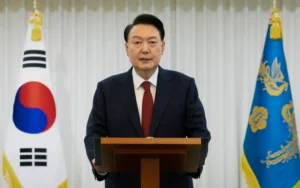South Korean court issues warrants to examine President Yoon’s
In response to accusations of rebellion connected to his brief proclamation of martial law, a South Korean court on Tuesday issued warrants to arrest and search impeached President Yoon Suk Yeol’s office and home.
This is the first time a detention warrant for a sitting South Korean president has been issued. Experts, however, think that unless Yoon is officially removed from office, imprisonment or searches are improbable.
According to the Corruption Investigation Office for High-Ranking Officials, which is spearheading a collaborative probe with police and military officials, the Seoul Western District Court issued the warrants to detain Yoon and search the presidential mansion and office in downtown Seoul.
The agency is looking into whether Yoon’s imposition of martial law on December 3 amounted to rebellion.
According to South Korean law, rebellion carries a life sentence or the death penalty. Yoon is protected from most criminal proceedings by presidential immunity; however, this immunity does not extend to accusations of treason or insurrection.
Since Yoon was impeached by the opposition-controlled National Assembly on December 14 for imposing martial law, his presidential authority has been suspended. During martial law, which is only allowed in times of war or emergency and does not permit suspending parliament, hundreds of soldiers and police personnel were sent to the assembly.
Yoon has justified his decree as a lawful act of governance, claiming it was a message to the Democratic Party, the largest opposition party, which he characterized as “anti-state forces” that utilized its legislative majority to unite with North Korea, impeach top officials, and hinder the government’s budget.
Whether to remove Yoon from office or restore him to the presidency will be up to the Constitutional Court.
Since Yoon has already evaded several requests for interrogation and his security service has prevented attempts to investigate his home and office, citing regulations safeguarding locations with state secrets, experts expect he will disregard the warrants.
Yoon Kap-keun, Yoon’s attorney, referred to the detention warrant as “illegal” and “invalid,” claiming that the anti-corruption agency is not authorized to look into rebellion-related accusations. The Presidential Security Service reiterated its pledge to ensure Yoon’s legal security.
Plans to enforce the warrants have not been disclosed by the anti-corruption agency. Detaining Yoon without his participation would be impracticable, according to Choi Jin, director of the Institute of Presidential Leadership. “Should investigators and the security service engage in physical altercations?” Choi inquired.
Nevertheless, in order to show their dedication to justice, investigators are probably going to pay Yoon a visit at home. Park Sung-min, a political expert, speculated that the warrant might be an attempt to coerce Yoon into assisting with the inquiry.
Former President Park Geun-hye set the standard for presidential resistance to investigation when she declined to appear with prosecutors prior to her impeachment and was only questioned and arrested after her removal from office.
Yoon’s six-hour martial law caused financial market instability, diplomatic hiccups, and political unrest. Legislators met and unanimously declared martial law to be lifted notwithstanding his use of police and troops.
Due to their involvement in martial law, Yoon’s defense minister, police chief, and senior military commanders have all been placed under custody. Yoon’s assertion that the troops were sent in to keep the peace has been refuted by the testimonies of commanders who were arrested. Kwak Jong-keun, one of the commanders, claimed that Yoon gave the order for troops to “quickly knock down the door and drag out the lawmakers.”
The impeachment of Acting President Han Duck-soo by the Democratic Party and smaller opposition parties last Friday for refusing to appoint three justices to the Constitutional Court exacerbated the political turmoil. Since six judges are required to uphold the motion, the vacancies may affect the court’s ruling regarding Yoon’s impeachment.
Citing the necessity to address political instability, Choi Sang-mok, the deputy prime minister and finance minister who is currently serving as South Korea’s interim leader, named two additional justices on Tuesday. Both the government and opposition parties criticized Choi’s conduct; the Democratic Party called for the appointment of the ninth justice to happen quickly, while the People Power Party accused him of caving in to the opposition.

The latest news and breaking news today : bravenewclimate
Source : apnews






.png)





